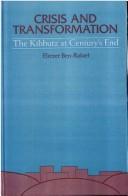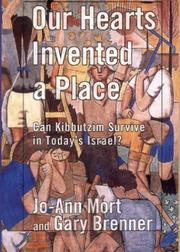| Listing 1 - 10 of 14 | << page >> |
Sort by
|
Book
ISBN: 0720405564 9780720405569 Year: 1977 Volume: 108 Publisher: Amsterdam North-Holland
Abstract | Keywords | Export | Availability | Bookmark
 Loading...
Loading...Choose an application
- Reference Manager
- EndNote
- RefWorks (Direct export to RefWorks)
Economic order --- Israel --- Collective settlements --- Kibbutzim --- Kibbutz settlements --- Kibbutzes --- Ḳibutsim --- Kibbutzim. --- Collective settlements - Israel
Multi
ISSN: 16615875 ISBN: 1299432921 303530128X 3034301332 Year: 2011 Volume: v. 9 Publisher: Oxford ; New York : Peter Lang,
Abstract | Keywords | Export | Availability | Bookmark
 Loading...
Loading...Choose an application
- Reference Manager
- EndNote
- RefWorks (Direct export to RefWorks)
In reaction to the spread of globalization, recent years have seen considerable growth in the number of intentional communities established across the world. In this collection of articles and lectures, many of them previously unpublished in English, the author analyzes various aspects of the philosophy of the kibbutz and draws parallels with other societies and philosophical trends, in the hope that a close look at the ways of thought of the kibbutz "arguably the best-established communalist society" may help other communalists crystallize their own social philosophies. Utopian thought and communal experience are brought to life through the extensive use of the voices of some of the most influential thinkers and kibbutz members of the past hundred years, including Martin Buber and David Ben Gurion.
Kibbutzim --- Collective settlements --- History. --- Social conditions. --- Kibbutz settlements --- Kibbutzes --- Ḳibutsim --- Aliyah --- Judaism --- Kibbutz Movement --- Zionism
Book
ISBN: 0691093911 1306993911 0691614768 0691101248 1400856582 9781400856589 9780691093918 9780691101248 9780691614762 Year: 2014 Publisher: Princeton, N.J. Princeton University Press
Abstract | Keywords | Export | Availability | Bookmark
 Loading...
Loading...Choose an application
- Reference Manager
- EndNote
- RefWorks (Direct export to RefWorks)
Focusing on the evolution of one border kibbutz from 1938 to the present, Paula Rayman explores the dynamics between internal community organization and external national and international forces.Originally published in 1982.The Princeton Legacy Library uses the latest print-on-demand technology to again make available previously out-of-print books from the distinguished backlist of Princeton University Press. These editions preserve the original texts of these important books while presenting them in durable paperback and hardcover editions. The goal of the Princeton Legacy Library is to vastly increase access to the rich scholarly heritage found in the thousands of books published by Princeton University Press since its founding in 1905.
Kibbutzim --- Kibbutz settlements --- Kibbutzes --- Ḳibutsim --- Collective settlements --- Case studies. --- Economic sociology --- Community organization --- Political systems --- Israel

ISBN: 0585065217 9780585065212 9780791432259 0791432254 9780791432266 0791432262 0791432254 0791432262 079149635X Year: 1997 Publisher: Albany, N.Y. State University of New York Press
Abstract | Keywords | Export | Availability | Bookmark
 Loading...
Loading...Choose an application
- Reference Manager
- EndNote
- RefWorks (Direct export to RefWorks)
This book examines kibbutz life following the Israeli economic crisis of 1985, focusing on the kibbutz's dramatic transformation from a well-defined social structure to a collective identified principally by its cultural preoccupations. It centers on the contradictions endemic to kibbutz identity. Ben-Rafael shows how the crisis brought together a general pro-change Zeitgeist with the interests of the kibbutz's stronger social segments and individuals to produce widespread changes and the fragmentation of kibbutz reality as a whole. The book's findings are based on a large-scale research investigation (1991-1994) headed up by Ben-Rafael that included twenty research studies and involved the participation of researchers from diverse social-science disciplines. The book also provides a statistical abstract and a comprehensive kibbutz bibliography.
Kibbutzim. --- Political Science --- Law, Politics & Government --- Socialism, Communism & Anarchism --- Kibbutz settlements --- Kibbutzes --- Ḳibutsim --- Collective settlements --- Economic order --- Israel
Book
ISBN: 3110464098 311046621X 9783110466218 9783110464092 311046375X 9783110463750 311046375X 9783110463750 Year: 2017 Publisher: München Wien
Abstract | Keywords | Export | Availability | Bookmark
 Loading...
Loading...Choose an application
- Reference Manager
- EndNote
- RefWorks (Direct export to RefWorks)
Resting on the multifaceted and multicultural voices of women – secular and religious, old-timers and newcomers, at the center or on the periphery of their communities – it brings into sharper focus rarely raised issues related to gender borders and to the private and public spheres.Beyond the specific society they treat, these essays contribute to our understanding of the social mechanisms that (re)produce gender inequality in modernity, in its socialist, capitalist, or postindustrial versions.They also provide additional evidence for the limits of any attempt to achieve gender equality by focusing on the transformation of women, without challenging hegemonic masculinities.
Women --- Sex role --- Sex differences --- Kibbutzim. --- Moshavim. --- Agriculture, Cooperative --- Kibbutz settlements --- Kibbutzes --- Ḳibutsim --- Collective settlements --- Gender role --- Sex (Psychology) --- Sex differences (Psychology) --- Social role --- Gender expression --- Sexism --- Religious aspects. --- Gender roles --- Gendered role --- Gendered roles --- Role, Gender --- Role, Gendered --- Role, Sex --- Roles, Gender --- Roles, Gendered --- Roles, Sex --- Sex roles

ISBN: 0511557337 052140388X 0521050278 Year: 1992 Publisher: Cambridge : Cambridge University Press,
Abstract | Keywords | Export | Availability | Bookmark
 Loading...
Loading...Choose an application
- Reference Manager
- EndNote
- RefWorks (Direct export to RefWorks)
This work in the field of intellectual history explores religious ideas which emerged in Jewish thought under the influence of secular ideologies, and in response to the social and cultural realities created by Jewish Emancipation, Zionism and socialism. By concentrating on the major Jewish Orthodox movements of the nineteenth and twentieth centuries, Professor Fishman examines the innovative mechanisms of traditional Judaism that were activated by these movements, as they strove to accommodate new realities. The study focuses specifically on the Religious Kibbutz Federation in Israel, which (in the process of building its self-contained pioneering settlements) developed a religious sub-culture that incorporated the central values of Jewish nationalism and socialism. Professor Fishman shows that - by creating the most far-reaching synthesis of modern, and traditional Jewish, culture at the community level - the settlements of the RKF may be regarded as a test case for the measure of the capacity of Judaism to adapt to modern life.
Orthodox Judaism --- Kibbutzim --- Religious Zionism. --- Judaism --- Zionism --- Kibbutz settlements --- Kibbutzes --- Ḳibutsim --- Collective settlements --- Jewish sects --- Ex-Orthodox Jews --- History. --- Religion. --- Ḳibuts ha-dati (Israel) --- Religious Kibbutz Federation (Israel) --- RKF --- Hakibbutz Hadati (Israel) --- Kibbutz Dati (Israel) --- קיבוץ הדתי --- קיבוץ הדתי (ישראל) --- Arts and Humanities --- Religion

ISBN: 1501729004 0801439302 Year: 2018 Publisher: Ithaca, NY : Cornell University Press,
Abstract | Keywords | Export | Availability | Bookmark
 Loading...
Loading...Choose an application
- Reference Manager
- EndNote
- RefWorks (Direct export to RefWorks)
"We thought we were living in a society of the future, showing how people can live together in a way that the human being is not a product of society where you have to put somebody down so that you are up.... Suddenly we [find] that people want to be more like outside, and we are disappointed."When people say to me, 'We're so sorry to see what's going on in the kibbutzim because we are losing the most important thing that happened to the State of Israel,' I say to them, 'Listen....' The government lost interest in the kibbutz movement, and we had to find another way. The State of Israel slowly but surely became a normal state, and the pioneers finished their job. We are living in a new era. We have to make the adjustment."-from Our Hearts Invented a PlaceOne of the grand social experiments of modern time, the Israeli kibbutz is today in a state of flux. Created initially to advance Zionism, support national security, and forge a new socialist, communal model, the kibbutzim no longer serve a clear purpose and are struggling financially. In Our Hearts Invented a Place, Jo-Ann Mort and Gary Brenner describe how life on the kibbutz is changing as members seek to adapt to contemporary realities and prepare themselves for the future. Throughout, the authors allow the members' often-impassioned voices-some disillusioned, some optimistic, some pragmatic-to be heard."The founders [of the kibbutz] had a dream," an Israeli told the authors in one of many interviews they conducted between 2000 and 2002, "[which] they fulfilled... a hundred times." The current generation, he explains, must alter that dream in order for it to survive. After tracing the formidable challenges facing the kibbutzim today, Mort and Brenner compare three distinct models of change as exemplified by three different communities. The first, Gesher Haziv, decided to pursue privatization. The second, Hatzor, is diversifying its economy while creating an extensive social safety net and a system of private wages with progressive taxation. In the third instance, Gan Shmuel is attempting to hold on to the traditional kibbutz model.In closing, the authors address the new-style urban kibbutz. Their book will provide readers with a deeper understanding of the kibbutz-and of Israel itself-during an era of dramatic social, economic, and political change.
Kibbutzim --- Kibbutz settlements --- Kibbutzes --- Ḳibutsim --- Collective settlements --- Social conditions --- Gan Shemuʼel (Israel) --- Gesher ha-Ziṿ (Israel) --- Ḥatsor Ashdod (Israel) --- H̲az̲or Ashdod (Israel) --- Yasur (Israel) --- Gesher Haziv (Israel) --- Gesher HaZiw (Israel) --- Jisr ez Zib (Israel) --- Gan Shmuel (Israel) --- Ganshmuel (Israel)

ISBN: 0415289661 0203217373 9780203217375 9780415289665 1138008648 9781138008649 1134439229 9781134439225 1280280433 9781280280436 9786610280438 6610280436 9781134439171 9781134439218 Year: 2002 Publisher: London New York Routledge
Abstract | Keywords | Export | Availability | Bookmark
 Loading...
Loading...Choose an application
- Reference Manager
- EndNote
- RefWorks (Direct export to RefWorks)
Examining the relationship between Judaism as a religious culture and kibbutz life, this is a ground-breaking work in the research of Judaism.The book takes as its point of departure the historical fact that it was Orthodox pioneers of German origin, in contrast to their Eastern European counterparts, who successfully developed religious kibbutz life. Employing sociological concepts and methods, the author examines the correlations between two evolutionary phases in kibbutz development and two modes of Judaism: the rational Halakhic and the emotive Hassidic modes. In doing this, he explore
Orthodox Judaism --- Israel --- Kibbutzim --- Sociological aspects --- Religion --- Social interaction --- Action theory --- Action theory. --- Jewish sociology. --- Sociology, Jewish --- Sociology --- Goal-directed action --- Goal-directed behavior --- Theory, Action --- Psychology --- Human interaction --- Interaction, Social --- Symbolic interaction --- Exchange theory (Sociology) --- Social psychology --- Kibbutz settlements --- Kibbutzes --- Ḳibutsim --- Collective settlements --- Jewish sects --- Ex-Orthodox Jews --- Social aspects --- Sociological aspects. --- Religion. --- Philosophy --- Ḳibuts ha-dati (Israel) --- Religious Kibbutz Federation (Israel) --- RKF --- Hakibbutz Hadati (Israel) --- Kibbutz Dati (Israel) --- קיבוץ הדתי --- קיבוץ הדתי (ישראל) --- Kibuts ha-dati (Israel)

ISBN: 0585063222 9780585063225 079140207X 9780791402078 0791402088 9780791402085 9781438401553 1438401558 9781438401553 Year: 1990 Publisher: Albany State University of New York Press
Abstract | Keywords | Export | Availability | Bookmark
 Loading...
Loading...Choose an application
- Reference Manager
- EndNote
- RefWorks (Direct export to RefWorks)
Pressure groups --- Industrialists --- Kibbutzim --- Kibbutz settlements --- Kibbutzes --- Ḳibutsim --- Collective settlements --- Manufacturers --- Businesspeople --- Advocacy groups --- Interest groups --- Political interest groups --- Special interest groups (Pressure groups) --- Functional representation --- Political science --- Representative government and representation --- Lobbying --- Policy networks --- Political action committees --- Social control --- Political activity --- Gush emunim (Israel) --- Bloc of the Faithful (Israel) --- Ghūsh Imūnīm (Israel) --- Tenuʻat Gush emunim (Israel) --- Goush Émounim (Israel) --- גוש אמונים (ישראל) --- גוש־אמונים --- Gusch Emunim --- Israel --- Politics and government

ISBN: 9780754648314 9781315262215 9781351957366 9781138257597 Year: 2007 Publisher: Aldershot (England) ; Burlington (VT) : Ashgate Pub.,
Abstract | Keywords | Export | Availability | Bookmark
 Loading...
Loading...Choose an application
- Reference Manager
- EndNote
- RefWorks (Direct export to RefWorks)
Il y a plus de 450 colonies moshavim et environ 270 kibboutzim en Israël. Bien qu'il existe une gamme de mouvements kibboutz communaux et de coopération, le tout avec de légères différences idéologiques, ils sont de toutes les communautés rurales collectives, fondées sur un idéal de créer un règlement sociale utopique. Ce livre place le kibboutz dans le contexte plus large des utopiques idéaux sociaux et fait comprendre comment ils ont été historiquement et architecturalement construits. Ce livre traite de la forme du "règlement idéal" comme une partie intégrante et des moyens pour réaliser une doctrine utopique. Il présente une analyse de la planification physique dans le kibboutz à travers les 80 dernières années et comment les changements dans l'idéologie se reflètent dans des changements dans l'aménagement et l'esthétique. Ce faisant, ce livre montre comment un organisme de règlement utopique se comporte au fil du temps, de leur première apparition en 1920 à un examen des dispositions actuelles spatiales et les directions de leur développement futur attendu.
Kibbutzim. --- Kibbutzim --- Collective settlements --- City planning --- Architecture and society --- Utopias --- Kibboutz --- Communautés --- Urbanisme --- Architecture et société --- Utopies --- Planning --- Design --- Social aspects --- Planification --- Aspect social --- Architecture --- 711.4 <569.4> --- 711.427 --- 911.372.2 --- 728.2 --- Kibbutz settlements --- Kibbutzes --- Ḳibutsim --- Architecture and sociology --- Society and architecture --- Sociology and architecture --- Communal settlements --- Communistic settlements --- Communism --- Cooperation --- Socialism --- Collective farms --- Communal living --- Gemeentelijke planologie. Stadsplanning. Stedenbouw--Israël --- Planologie: ideaalsteden; legendarische steden --- Vestigingen naar ruimtelijke spreiding en situering --- Woningblokken. Meergezinshuizen. Etagewoningen. Flatgebouwen --- Human factors --- 728.2 Woningblokken. Meergezinshuizen. Etagewoningen. Flatgebouwen --- 711.427 Planologie: ideaalsteden; legendarische steden --- 711.4 <569.4> Gemeentelijke planologie. Stadsplanning. Stedenbouw--Israël --- Communautés --- Architecture et société --- Kibboutz.
| Listing 1 - 10 of 14 | << page >> |
Sort by
|

 Search
Search Feedback
Feedback About UniCat
About UniCat  Help
Help News
News